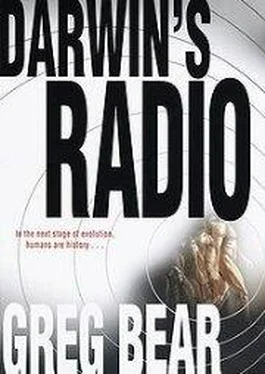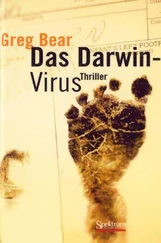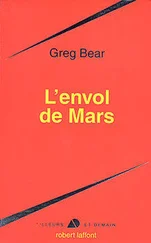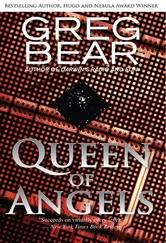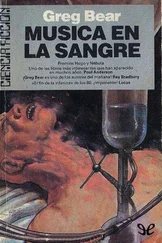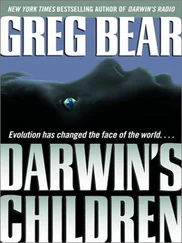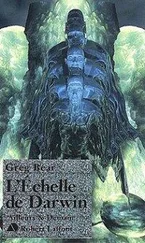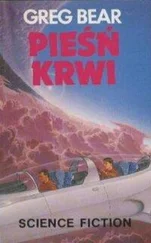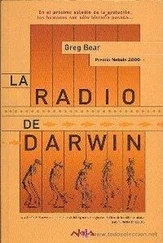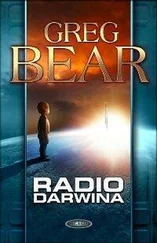He stared blankly at the wall as an elderly woman volunteer pushed a wheeled cart into his room to deliver his lunch. She was a cheerful, dwarfish woman about five feet tall, in her seventies, with a wizened apple face, and she spoke in rapid German with a soft Viennese accent. Mitch couldn’t understand much of what she said.
The elderly volunteer unfolded his napkin and tucked it into his gown. She pressed her lips together and leaned back to examine him. “Eat,” she advised. She frowned and added, “One damned young American, neinl I do not care who you are. Eat or sickness comes.”
Mitch picked up the plastic fork, saluted her with it, and began to pick at the chicken and mashed potatoes on the plate. As the old woman left, she switched on the television mounted on the wall opposite his bed. “Too damned quiet,” she said, and waved her hand back and forth in his direction, delivering a chiding, long-distance slap to his face. Then she pushed the cart through the door.
The television was tuned to Sky News. First came a report on the final and years-delayed destruction of a large military satellite. Spectacular video from Sakhalin Island traced the object’s last flaming moments. Mitch stared at the telephoto images of the veering, sparkling fireball . Outdated, useless, down inflames.
He picked up the remote and was about to shut off the television once more when an inset of an attractive young woman with short dark hair, long bangs, large eyes, illustrated a story about an important biological discovery in the United States.
“A human provirus, lurking like a stowaway in our DNA for millions of years, has been associated with a new strain of flu that strikes only women,” the announcer began. “Molecular biologist Dr. Kaye Lang of Long Island, New York, has been credited with predicting this incredible invader from humanity’s past. Michael Hertz is on Long Island now.”
Hertz was formally sincere and respectful as he spoke with the young woman outside a large, fashionable green and white house. Lang seemed suspicious of the camera.
“We’ve heard from the Centers for Disease Control, and now from the National Institutes of Health, that this new variety of flu has been positively identified in San Francisco and Chicago, and there’s been a pending identification in Los Angeles. Do you think this could be the flu epidemic the world has dreaded since 1918?”
Lang stared nervously at the camera. “First of all, it’s not really a flu. It’s not like any influenza virus, and for that matter, doesn’t resemble any virus associated with colds or flu…It isn’t like any of them. For one thing, it seems to cause symptoms only in women.”
“Could you describe this new, or rather very old, virus for us?” Hertz asked.
“It’s large, about eighty kilobases, that is—”
“More specifically, what kind of symptoms does it cause?”
“It’s a retrovirus, a virus that reproduces by transcribing its RNA genetic material into DNA and then inserting it into the DNA of a host cell. Like HIY It seems quite specific to humans—”
The reporter’s eyebrows shot up. “Is it as dangerous as the AIDS virus?”
“I’ve heard nothing that tells me it’s dangerous. It’s been carried in our own DNA for millions of years; in that way, at least, it’s not at all like the HIV retrovirus.”
“How can our women viewers know if they’ve caught this flu?”
“The symptoms have been described by the CDC, and I don’t know anything more than what they’ve announced. Slight fever, sore throat, coughing.”
“That could describe a hundred different viruses.”
“Right,” Lang said, and smiled. Mitch studied her face, her smile, with a sharp pang. “My advice is, stay tuned.”
“Then what is so significant about this virus, if it doesn’t kill, and its symptoms are so slight?”
“It’s the first HERV — human endogenous retrovirus — to become active, the first to escape from human chromosomes and be laterally transmitted.”
“What does that mean, laterally transmitted?”
“That means it’s infectious. It can pass from one human to another. For millions of years, it’s been transmitted vertically — passed from parents to children through their genes.”
“Do other old viruses exist in our cells?”
“The latest estimate is that as much of one third of our genome could consist of endogenous retroviruses. They sometimes form particles within the cells, as if they were trying to break out again, but none of these particles have been efficient — until now.”
“Is it safe to say that these remnant viruses were long ago broken or dumbed down?”
“It’s complicated, but you could say that.”
“How did they get into our genes?”
“At some point in our past, a retrovirus infected germ-line cells, sex cells such as egg or sperm. We don’t know what symptoms the disease might have caused at that time. Somehow, over time, the provirus, the viral blueprint buried in our DNA, was broken or mutated or just plain shut down. Supposedly these sequences of retroviral DNA are now just scraps. But three years ago, I proposed that provirus fragments on different human chromosomes could express all the parts of an active retrovirus. All the necessary proteins and RNA floating inside the cell could put together a complete and infectious particle.”
“And so it has turned out. Speculative science bravely marching ahead of the real thing…”
Mitch hardly heard what the reporter said, focusing instead on Lang’s eyes: large, still wary, but not missing a thing. Very bold. A survivor’s eyes.
He switched the TV off and rolled over on the bed to nap, to forget. His leg ached inside the long cast.
Kaye Lang was close to grabbing the brass ring, winning a big round in the science game. Mitch, on the other hand, had been handed a solid gold ring…And he had fumbled it badly, dropped it on the ice, lost it forever.
* * *
An hour later, he awakened to an authoritative knock on the door. “Come in,” he said, and cleared his throat.
A male nurse in starched green accompanied three men and a woman, all in late maturity, all dressed conservatively. They entered and glanced around the room as if to take note of possible escape routes. The shortest of the three men stepped forward and introduced himself. He held out his hand.
“I am Emiliano Luria, of the Institute for Human Studies,” he said. “These are my colleagues at the University of Inns-bruck, Herr Professor Friedrich Brock…”
Names that Mitch almost immediately forgot. The nurse brought two more chairs in from the hallway, and then stood by the door at parade rest, folding his arms and lifting his nose like a palace guard.
Luria spun his chair around, back to front, and sat. His thick round eyeglasses gleamed in the gray light through the curtained windows. He fixed his gaze on Mitch, made a small urn sound, then glared at the nurse. “We will be fine, alone,” he said. “Please go. No stories sold to the newspapers, and no big damned goose chases for bodies on the glaciers!”
The nurse nodded amiably and left the room.
Luria then asked the woman, thin and middle-aged, with a stern, strong face and abundant gray hair tied in a bun, to make sure the nurse was not listening. She stood by the door and peered out.
“Inspector Haas in Vienna assures me they have no further interest in this matter,” Luria said to Mitch after these formalities were observed. “This is between you and us, and I will work with the Italians and the Swiss, if we must cross any borders.” He pulled a large folding map from his pocket, and Dr. Block or Brock or whatever his name was held out a box containing a number of picture books on the Alps.
Читать дальше
Конец ознакомительного отрывка
Купить книгу
